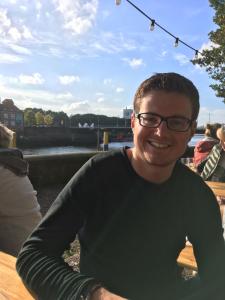Philip Leenen
|
Alumnus Job title Company Graduated Faculty Degree Date of the interview |
 |
You graduated in 2015 with a degree in Agribusiness. Can you tell us a bit about your career path since then?
I worked for a few gardening companies even before I began studying. The business side of things always fascinated me the most, so I knew early on that I wanted a career in the plant business. The Lower Rhine is actually one of the largest hubs for commercial plant distributors in Europe (next to Aalsmeer, a region near Amsterdam in the Netherlands). Since I grew up there and wanted to live and work there in the future, I decided to do my internship semester in the Netherlands while I had the chance. In Aalsmeer I worked at a plant distributor for six months in early 2015 that catered primarily to large retailers in Germany (garden centres, DIY stores, supermarkets etc.) My time there left a lasting impression and cemented my plans to work in this industry after graduation. I was also able to improve my Dutch (I studied it in school years ago), which has really helped my career too. While working in the Netherlands I was lucky to receive job offers from both Dutch and German companies. I decided to work for Landgard, the largest consortium for flower and plant producers in Germany, in the city of Straelen. I worked there from January 1st, 2016 to July 1st, 2017. I was Key Account Manager and responsible for managing purchasing and distribution for our major clients (supermarkets and discounters across Europe). In 2017, one of these clients, Kaufland, approached me and asked if I’d like to work for them in their purchasing department. Long story short: I went from seller to purchaser.
You currently work for Kaufland, a major German supermarket chain. What are your main responsibilities?
I joined Kaufland in July 2017 and was immediately given responsibility for purchasing potted plants for resale in our approximately 1,300 supermarkets all across Europe. My weekly tasks generally include negotiating prices, planning product lines and advertisement strategies, quality control and sales analysis. On top of these regular tasks, I will often attend trade fairs and exhibitions to discover new products, contribute to ongoing company projects and take part in team meetings with colleagues in different countries.
What do you enjoy most about your job?
I really enjoy the collegial atmosphere and the amount of responsibility I have. Plants are an absolute passion of mine for a few reasons: personal interest, my connection to the Lower Rhine region, and my family’s history. I am lucky to be able to combine this passion with the enormous opportunities in stationary retail. Plus I am always able to incorporate my ideas into my work and make them a reality.
Which skills did you acquire during your studies that have proven useful in your current job?
A few skills in particular have had a lasting impact. Most notable are my advanced English skills (particularly terminology) and my well-developed soft skills (the confidence to negotiate, lead others and speak before groups). My degree programme was full of students from a variety of international backgrounds. Communicating with others was sometimes a bit difficult, but in retrospect the experience really helped me to see the world from different angles. I also learned things in the lectures on agriculture and courses on labour laws and economics that I still use today.
You also teach the course “Current Issues in Agribusiness” at Rhine-Waal University of Applied Sciences for students currently studying Agribusiness. Can you give us a rundown of the most important developments in this field in recent years?
That is correct. After graduation I was offered the opportunity to remain connected with HSRW, but as a teacher. “Current Issues” is chance to explore the latest topics in agriculture and adjacent sectors every semester. Topics range from long-term, overarching issues such as climate change or how politics shape European Union policy, to very recent developments such as Bayer’s acquisition of Monsanto. The course also allows students – who last semester came from 15 different countries and four different continents – to incorporate their own topics and experiences in agribusiness. This approach lets students explore issues through an international lens. Beyond lectures, there are also a series of excursions to local companies each semester intended to introduce students to the sheer variety of agribusiness companies in the Lower Rhine region. During these excursions, students can interact directly with company representatives and even do some important networking for the future. These excursions have spawned more than a few thesis projects and internships. It's definitely an exciting experience each year.
If you could go back in time, would you choose to study Agribusiness again? Why or why not?
In a word: absolutely!
My class was full of students from a variety of international backgrounds. Though communication was sometimes difficult, in retrospect the experience really helped me to see the world from different angles. There are quite a few degree programmes in Germany and the Netherlands dedicated to agriculture and economics. But one degree programme that combines agricultural production, economics and international studies in a modern, open and accessible way? That’s hard to find. Every student who travels from afar just to study in Kleve is proof of that.
Describe Rhine-Waal University of Applied Sciences in three words.
Modern, international, pleasant
